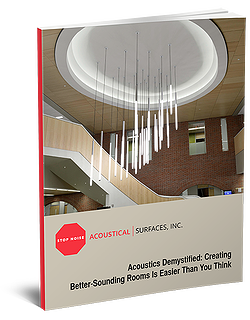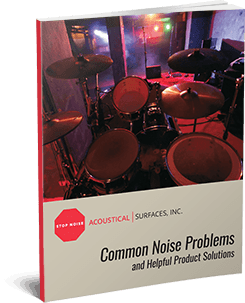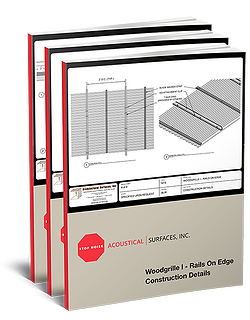Do Landlords Need to Soundproof Apartments and Rentals?
If you’ve ever lived in an apartment building or busy city, then there’s a good chance you’ve experienced intrusive sounds from nearby units and other neighborhood sources. Oftentimes, this noise can be unbearable and make it difficult to work, sleep, and live in your own home.
When noise disturbance issues become severe, you may wonder to yourself: Do landlords need to soundproof their rentals? In many cases, indeed they do—but this can vary based on region and other factors.
If you’re a landlord, however, soundproofing is always a smart idea as it can increase property values and lead to happier tenants. In this guide, we’ll unpack landlords’ legal soundproofing obligations and offer some key tips on how to mitigate any noise issues in apartments and other rentals.
The Importance of Soundproofing Rental Properties
When many people live close together and share adjoining walls—such as in apartments, townhomes, and multi-family dwellings—noise transfer is bound to happen. Normal walls, such as those made from drywall, offer minimal sound protection—even if they’re insulated.
Sound Transmission Class (STC) measures a material’s capabilities to block sound transfer and, at a rating of 33 STC, drywall has essentially no soundproofing potential. At this level, you’ll likely be able to hear (and even understand) your neighbor’s conversations through your walls—which means they’ll likely hear yours as well.
Likewise, you’ll also be able to hear a variety of other common noises that are louder than normal speech, such as:
- Vacuum cleaners
- Telephone ringtones
- Outside traffic
Furthermore, as noises decrease in pitch and become more bassy, they can rattle buildings and cause even more annoyance. Frequencies below 100 hertz (Hz) tend to reverberate through structures, adding to the issue of ambient noise pollution.
Thankfully, more people are waking up to the benefits of quiet environments. Studies have shown that living in loud areas can result in increased annoyance and sleep disruption, which can snowball into deleterious health effects. Meanwhile, relative quiet presents restorative properties and correlates to improved health-related quality of life (HRQOL).
So, quiet homes are not only less annoying, but they’re also better for our health. Still, the question remains: are landlords legally obligated to provide a quiet environment?
Legal and Ethical Considerations for Landlords
A landlord’s obligation to mitigate sound issues varies by state and, oftentimes, the county or, in places such as Texas, the very city you live in. Other states, such as California, provide overarching protections guaranteeing tenants the right to a peaceful property.
Regardless of whether noise ordinances are established at the state or local level, many jurisdictions include provisions for a Right to Quiet Enjoyment in their landlord and tenant codes. These laws, however, play out differently across various localities. In Boston, for example, audible noise is limited to 70 decibels (dB) during the day and 50 dB at night.
Regardless of an area’s specific noise ordinance, however, soundproofing rentals is the ethical thing to do as quieter environments are healthier for their occupants. Not to mention, things can easily get loud in multi-family buildings and, if sound issues aren’t remedied, some jurisdictions will let tenants break their leases without penalty.
The Impact of Noise on Tenant Satisfaction and Retention
Excessive noise problems are a major annoyance and, for many, worth moving over. Over half of Americans say they’re irked by their neighbors on a monthly basis. Loud noise is the biggest issue fueling this frustration, with some of the most reported sources being:
- Television
- Loud music
- Pets
- Crying children
Over 60% of apartment renters have strongly considered moving over the frequent disturbances created by their neighbors. So, if you want to maximize your lease renewals and improve tenant satisfaction, find a way to quell your property’s sound problems.
Effective Soundproofing Solutions for Landlords
It’s not unheard of for some landlords to take the fastest, most cost-effective approach to fixing property issues. When partitioning a property into multiple rooms or units, for instance, they may make the common mistake we mentioned earlier of only using drywall and plain insulation to split the space up.
Such “quick fixes”, however, can cost you more down the road in repairs, lost revenue due to vacancy, and dealing with tenant noise complaints. Instead, it’s pertinent to install a long-term soundproofing solution that effectively isolate unwantd noise and last well into the future.
Thus, it’s best to use high-quality materials when soundproofing multi-unit residential dwellings, such as:
- RSIC Clips: Resilient Sound Isolation Clips – Sound isolation clips are installed within your wall and floor-ceiling assemblies to detach finished and structural surfaces. This significantly reduces the impact of vibrational noises such as those emanating from loud, low-frequency sources.
- Acoustic Underlayment – Whether you have carpet, hardwood, or another type of flooring in your property, laying down an underlay before the finished surface dramatically decreases the resonating noises of heavy footfalls and dragged furniture within lower units.
- Adjustable Acoustic Door Seal Kits – Noise in a space is like water in a fish tank: it’ll leak out anywhere that there’s a hole. In apartments, the biggest culprit for gaps is the area around their exterior doors. So, how to soundproof a door? Installing door seal kits to firmly close up these cracks and eliminate nose loss into hallways and other units.
Tips for Soundproofing Common Areas and Individual Units
It’s best to get soundproofing out of the way when constructing or renovating residential units. If you wait until your tenants complain about excessive noise, your property may have to sit vacant—thus earning you no money—while you make the necessary upgrades.
Additionally, common areas such as exercise rooms and co-living spaces can get particularly noisy as they’re used by many people at once. To stop the ruckus from leaking out, consider lining their walls with sound-blocking curtains and blankets. If spaces are particularly noisy, you may want to install Studio 3D doors to keep them entirely isolated. And, if sound problems still persist, you can try mixing a variety of different sound-blocking solutions to find the combination that works for your space.
Navigating the Challenges of Soundproofing Rental Properties
Rental properties are supposed to be profitable for landlords so, when investing in a soundproofing solution, you’ll want to balance their price with their effectiveness. That’s why, as just mentioned, it’s best to build-in soundproofing during initial construction or renovations to avoid paying for additional drywall, paint, flooring, and other materials.
You can also try applying external solutions, such as the sound blankets mentioned earlier or Acoustic Barrier Ceiling Tiles that install easily as drop ceilings. Depending on the age of your property, this may be the only option. Some older buildings have plaster walls that, barring total replacement, offer few soundproofing solutions. Likewise, there may be materials—such as antique flooring or fixtures—that aren’t produced anymore and you may be hesitant to tear them out.
Such properties must be assessed on a case-by-case basis to determine potential soundproofing solutions. For cracked plaster walls, filling gaps with Green Glue Viscoelastic Damping Compound can help mitigate sound loss between rooms. If you’re hoping to preserve antique hardwood but still want to limit reverberations, covering them with rugs will eliminate some of the sound from heavy footsteps.
Enhancing Rental Property Value through Soundproofing
Soundproofing isn’t just a courtesy to your tenants, it’s an investment in the future worth of your property. Studies into the relationship between excess sound and property value show that noisy properties sell for up to 20% less than their quiet counterparts.
If you want to increase your property’s value, satisfy your tenants, and reduce your chances of broken leases, it’s crucial to control unwanted noise issues. If you’d like more information on any soundproofing materials or want a custom solution for your noise needs, let Acoustical Surfaces know about your sound issues—we can restore your tenants’ peace and your property’s value.




